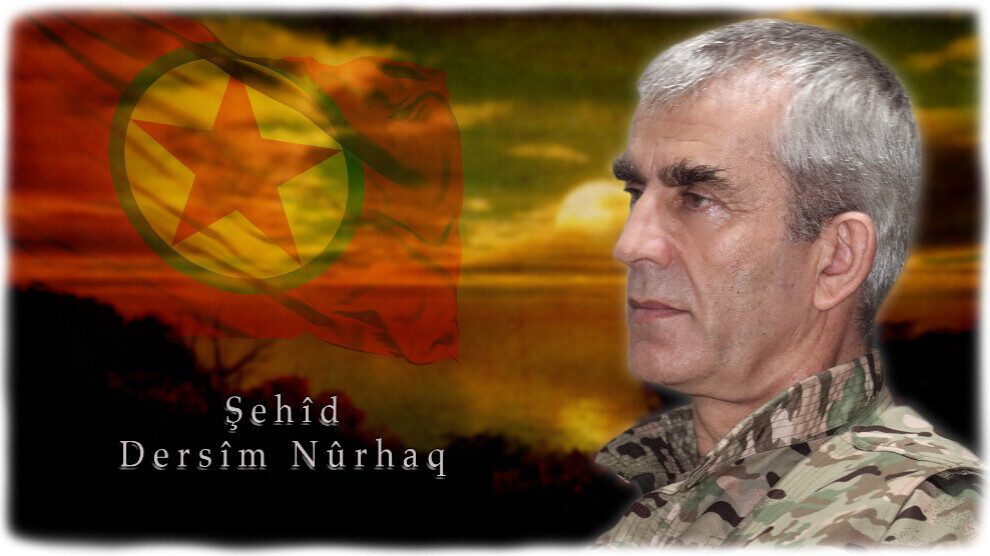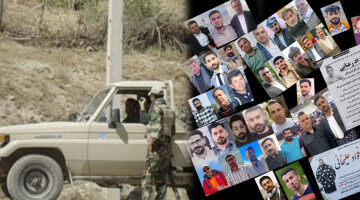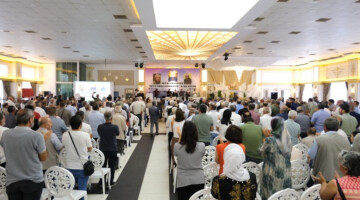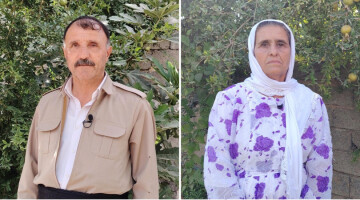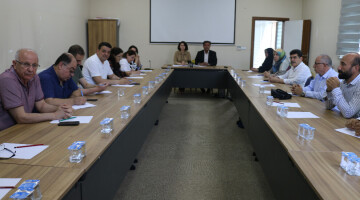The People's Defense Forces (HPG) have published an obituary for Dersim Nurhaq. He was a member of the Executive Council of the Kurdistan Workers' Party (PKK), and was killed on 1 October 2021 in an attack by the Turkish state in the Medya Defense Areas. He had joined the Kurdish liberation movement in 1990 and was considered a pioneer of the decisive battle in the mountains.
The HPG said Dersim Nurhaq was a "contemporary dervish and revolutionary creator of values" who shaped the guerrilla resistance for decades. We remember this great revolutionary with love, respect and gratitude and express our condolences to his family and the Kurdish people. Our solidarity goes out to him and his work." The HPG shared the following about the biography of the martyr:
Code name: Dersim Nurhaq
First and last name: Izzettin Inan
Place of birth: Malatya (Meletî)
Names of mother and father: Canê - Hasan
Date and place of death: October 1, 2021 / Medya Defense Areas
Born as a socialist
Dersim Nurhaq was born in 1967 in Wêranşar (Doğanşehir), a district in the south of the Kurdish province of Meletî (Malatya). Due to their Alevi faith, his family history was marked by a history of persecution that goes back to the Ottoman Empire. Even then, Alevis were persecuted as heretics.
Dersim Nurhaq's mother's grandfather, for example, was the insurgent Bozoyê Çindê, who led the resistance against the Ottomans in the triangle of Wêranşar-Çirmik-Arxa (Doğanşehir-Yeşilyurt-Akçadağ) at the beginning of the 20th century. The connection to one's own faith is therefore always at the center of the family's daily life. Dersim Nurhaq grew up in a natural, communal village life that was shaped by the culture of the Alevi-Kurdish Balyan tribe. Their communities are characterized by a socialist structure that has shaped not only religious life, but also social life. The term "socialist" here refers to a sociological concept in favor of a community oriented towards equality and solidarity.
Admiration for the prison resistance in Diyarbakır
Dersim Nurhaq soon became interested in socialism in the political sphere. After attending primary and secondary school in Meletî, he moved to Amed (Diyarbakır) in 1983, where he attended high school. Here, the traces of the 1980 military coup were still particularly fresh. He marveled at the PKK's resistance in Zîndana Amedê - the "Hell of Diyarbakır", as the military prison was called - and admired the "Apoists" for standing up to the storm of oppression and persecution that blew in Turkey after the coup.
When other Kurdish organizations and the Turkish left lost their structures at the beginning of the military dictatorship and their leaders fled to Europe without political prospects, PKK leader Abdullah Öcalan had already ordered a tactical retreat within the Middle East. But some cadres who remained in North Kurdistan and Turkey ended up in prison. Dersim Nurhaq got to know many of them and subsequently joined the PKK. In 1986, he began studying journalism at Istanbul's Marmara University and at the same time became involved in the student movement on behalf of the Kurdish youth organization YCK. In the course of this activism he was arrested several times.
On duty in Hakkari
After reading the work "Kürdistan Devriminin Yolu - Manifesto" ("The Path of Revolution in Kurdistan"), the PKK's first party program, Dersim Nurhak joined the party. It was 1990 when he went to the mountains in Yüksekova (Gever), at a time when the war in Kurdistan was particularly bloody and the guerrilla resistance was being led by the HPG's predecessor organization ARGK.
He was deployed in Çukurca (Çelê) and Hakkari (Colemêrg) and, despite his young age, excelled in courage, passion and high martial arts, which he put into practice in various important offensives against the Turkish army. Less than a year later, he was appointed team commander - not least because he opposed seditious tendencies in his own ranks with the ideological and political line of the PKK.
With Öcalan in the Bekaa Valley
In 1991, Dersim Nurhaq was invited by Abdullah Öcalan to the Lebanese Bekaa Valley, where the PKK operated its military Mahsum Korkmaz Academy in the village of Helve. His diary contains descriptions of this time: "When the president explained my team responsibility to me in front of the entire academy structure and asked: 'Can you do it?' my knees were shaking, and I tried not to reply that I couldn't. During the training and analysis, we had been prepared for a long and difficult militancy.
We had been admonished and encouraged; our assertiveness and determination were sharpened to share responsibility, to bear the burden of the task. An "I can't do it" would have been tantamount to accepting weakness. I couldn't bring myself to swallow that either. When the president saw my situation, he encouraged me. ‘We will use all the party's resources and take you to the province, but you must also use all the creativity of the guerrilla and protect yourself,’ he said. That's when I felt that I could not be worthy of leadership with ordinary militancy."
Dersim Nurhaq later described this experience as one of the most unforgettable moments of his life.
New fronts from the Taurus Mountains to the Mediterranean
The "province" to which the commander was sent was the "Southwest" guerrilla region, also known as "Tolhildan", which includes large parts of Dîlok, Gurgum (Maraş), Semsûr (Adıyaman), Meletî and Kilis. Until 1994, he fought in the Engizek and Nurhaq mountains. The following year, Dersim Nurhaq was deployed in Dersim and Qoçgirî, where he was injured several times in battles with Turkish military units. He and his group then went on a special mission to the Binboğalar massif in the Taurus Mountains. Öcalan had ordered the commander to expand the armed resistance to the Turkish provinces.
Dersim Nurhaq paved the way for the guerrillas from the Taurus Mountains to the Mediterranean. This path even led to the coastal region of Antalya, where he was injured again, this time by falling from the cliffs. In Antalya, the group targeted the Turkish state's war economy. The blows were so severe that the army leadership was forced to move its special units stationed in North Kurdistan to Antalya. The military was unable to track down Dersim Nurhak and his unit. After about a year in Antalya, the group returned to the "southwest province". Öcalan had foreseen it: the guerrillas had opened new fronts in the war and taken the armed struggle to a new level - and planted the seeds of successes to come.

Retreat to the south
At the beginning of the 2000s, Dersim Nurhaq moved to the Medya Defense Areas. The decision was made in the wake of Abdullah Öcalan's abduction from Kenya to Turkey and his call for the guerrillas to retreat to South Kurdistan. There, the commander initially underwent training at the central party school named after Mazlum Doğan, and in 2003 he took over the leadership of the regional command of the Serhed region in North Kurdistan. From 2006, he trained fighters in the central headquarters of the HPG and led the resistance in Xakurke.
In 2010, Dersim Nurhaq devoted himself to deepening the theoretical and methodological analysis of Öcalan's philosophy in its application to the revolutionary people's war. Öcalan had written his famous prison writings while in solitary confinement, in which he initiated the PKK's paradigm shift from a national liberation party to a radically democratic, feminist, ecological and politically open grassroots movement for the entire Middle East and founded the political philosophy of democratic confederalism. This now had to be put into practice.
Fight against ISIS in Afrin
Dersim Nurhaq went to the Amanos Mountains on Turkish territory to advance the revolutionary people's war. But when the "Arab Spring" in 2011 brought about a lasting change in the status quo in the Middle East, the popular uprisings that also spread to Rojava revealed the reality of an impending revolution. This finally took place in July 2012. After the Syrian army had largely withdrawn from the north that year, the first three cantons of the Democratic Federation of Northern Syria, namely Afrin (Efrîn), Kobanê and Cizîrê, were declared. "The proclamation of our people's will to govern themselves showed in all its severity that the revolution had reached a new stage. But the revolutionary breakthrough of our population in Western Kurdistan, especially in Afrin, attracted the attention of our people's sworn enemies. Afrin thus became the target of attacks early on," said the HPG in its obituary. The Islamic State, which was known from 2011 to 2014 under the names "Islamic State in Iraq and Syria" (ISIS) and "Islamic State in Iraq and the Levant" (ISIL), focused on the predominantly Kurdish Afrin.
A brave dervish
Dersim Nurhaq and his group left the Amanos Mountains and went to Rojava. They defended the population against ISIS and helped them organize self-defense units. "Hevalê Dersim in particular made great efforts to organize the people of Afrin on the basis of the perspective of a democratic nation, to support them in the development of their democratic system and to ensure the self-defense of the youth," wrote the HPG. He first returned to North Kurdistan and then to the Medya Defense Areas.
Commander at the Apollo Academies
In South Kurdistan, Dersim Nurhaq was commander at the Apollo Academies, where, among other things, members of the special unit "Hêzên Taybet" are trained.
He passed on the knowledge he had acquired through decades of practice in almost every corner of Kurdistan and beyond to other fighters with love and passion.
The HPG wrote: "Hevalê Dersim was a proven advocate of the paradigm of a guerrilla of democratic modernity. His work makes it easier to understand the success we have today in armed struggle. Dersim Nurhak was a revolutionary who steadfastly marched towards freedom for over three decades. He wrote an epic and became a legend. He will always be an example for his companions, the Kurdish youth and our entire people and will never be forgotten."

The HPG also remembered Canê Inan and Tacettin Inan, Dersim Nurhaq's mother and brother, who died in the earthquake in Antep (Dîlok) in February 2023.

